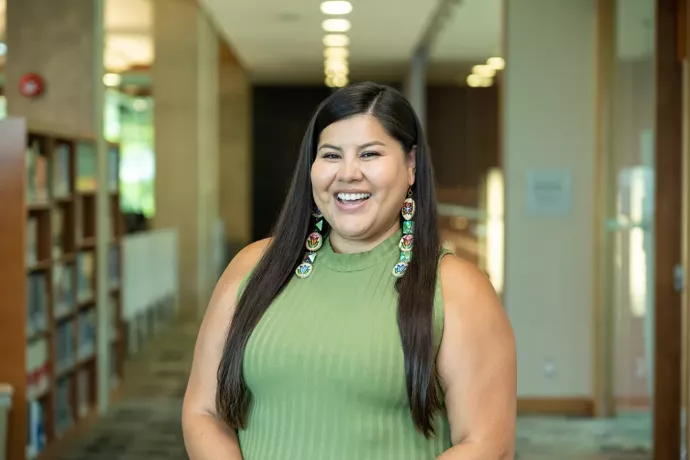
Tee Copenace is the director of the UTM Office of Indigenous Initiatives (UTM OII). She is an inspirational leader with over 20 years of experience working with Indigenous communities and organizations. Originally from Niisaachewan Anishinaabe Nation (Treaty 3), Tee is proud of her grassroots and is deeply committed to promoting equity and inclusion of Indigenous people across our campus and in the broader community.
Under Tee’s leadership, UTM OII is mobilizing University of Toronto’s commitments to Truth and Reconciliation as outlined in Answering the Call – Wecheehetowin. The OII guides UTM’s efforts to amplify Indigenous voices and support Indigenous placemaking on campus.
What inspired you to pursue a career in Indigenous Initiatives, and how has your personal journey influenced your approach to this role?
Growing up, my family never put an emphasis on the need to meet Western education’s expectations and perhaps it’s because I come from a long line of residential school survivors. I was taught to have the willingness to bring and share my gifts with and for community which led me to pursue a career in Indigenous education.
It was important that I also knew who I was as an Indigenous person in connection to traditional knowledge and the land all while ensuring I was proud and that I made my ancestors proud. I hope I am achieving this while following in the footsteps of my mom, Tina and cousins Apryl and Nina – all incredible Indigenous women from my mom’s side who have also earned graduate degrees!
What challenges do Indigenous students often face in higher education, and how does the office work to address these challenges?
Reflecting on my own education journey as an Indigenous student, I was always looking for a sense of belonging and extended community supports. UTM OII offers a safe and welcoming environment for Indigenous students through the UTM Indigenous Centre (IC). The IC provides service delivery, programming and support to Indigenous faculty, students, staff and librarians. The IC also hosts gatherings and cultural programming for UTM’s Indigenous members and provides an inclusive space for future Indigenous students.
In addition, UTM OII is a resource to campus faculty and staff, who may consult the OII for help in integrating Indigeneity into student life, physical spaces, course curriculums, faculty research and recruitment initiatives. We also work very closely with Indigenous Student Service – First Nations House.
Are there any specific projects that have had a notable impact on Indigenous women’s well-being or empowerment?
In October 2023, the UTM Indigenous Centre hosted a Ribbon Skirt Workshop with Indigenous fashion designer, Ocean Kiana, a Nishinaabe woodland style artist form Northwestern Ontario, raised by the Matriarchs of her family. Her Nishinaabe name is Waabshki Memegwans, meaning White Butterfly and she is of the Wolf Clan.
For those who may not know, a ribbon skirt holds profound cultural significance within many Indigenous communities. According to The Ribbon Skirt Project, “It can be an expression of womanhood and strength, of remembrance of the Missing and Murdered, a symbol of defiance and protection of natural resources against corporate powers, or a representation of the journey of those who are reclaiming their identities through traditional practices.”
As we celebrate International Women’s Day, what message or advice would you like to share with the university community?
Make your ancestors proud every day.
